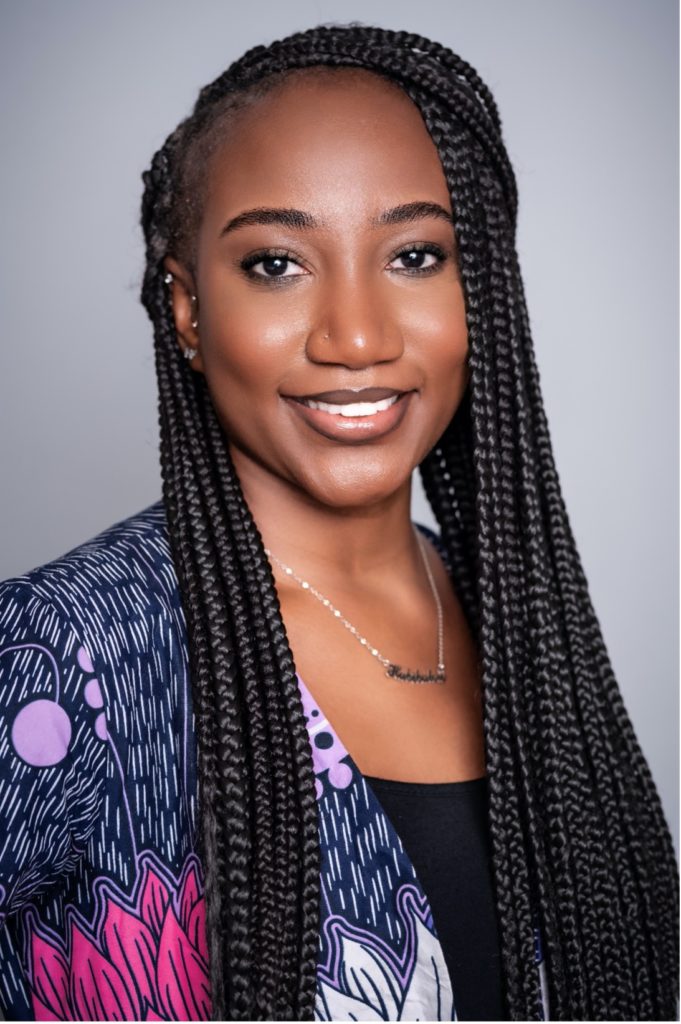by Kamila Kinyon
This spring, we will be publishing a series of spotlight articles about multilingual students at DU. These articles are based on interviews that Kamila Kinyon conducted about students’ memories of becoming multilingual, their connection to their heritage language, and their experiences at DU. This project is funded by a 4D Infusion Grant awarded for 2022-23 to Juli Parrish and Kamila Kinyon. We welcome this opportunity to celebrate DU’s multilingual speakers and writers.
An MA student in International Studies, Habibatou Traore was born in Mali, West Africa. She grew up speaking two languages, Bambara and French. While French is Mali’s official language and the language used in schools, Bambara is Habibatou’s heritage language and the dominant language spoken at home with family.
Habibatou relates that her family often mixed Bambara and French at home: “When you know multiple languages, we tend to mix words, so most of our conversation sometimes will be like a mix of French and Bambara.” While her parents spoke both Bambara and French fluently, Bambara was the main means of communication with her grandparents: “Grandma on mom’s side speaks and understands French but she cannot write. She didn’t go to school. She was a stay-at-home mom, and she took care of her kids and her little business of selling incense.” While Bambara served as a spoken heritage language for communication with relatives and friends, French was used for writing. Bambara was originally only a spoken language, and even though there was a movement in the 1960’s to transform it into a written language as well, relatively few people use it for writing.
In speaking about language instruction in Malian schools, Habibatou mentioned: “We learn a lot about our heritage in school…The fact that we are also able to speak our native language is so important and so crucial.” Although school is conducted in French, “they teach Bambara, Arabic, Spanish, and some other languages.” As a result of her background, Habibatou was bilingual in French and Bambara from an early age and already had a diverse linguistic knowledge when immigrating to the United States.
Due to the political crisis in Mali in 2012, Habibatou and her siblings immigrated to the U.S. to join their mother, who was studying at the University of Oregon at the time. Their mother was already fluent in English, having worked for 20 plus years at the Nigerian embassy. Habibatou relates that her mother helped her learn English through daily activities, such as speaking to cashiers while shopping: “I will use my phone and go on Google Translate and write it in French, and then it would translate it in English, and I would listen to it and then repeat it. So that was the way to learn.” She was also sent to a French immersion school, which made communicating easier: “We were taking three classes in French and then two English classes which made it a little bit easier for me to navigate the U.S education system.”
After completing her BA at the University of Oregon, Habibatou came to the University of Denver to work on an MA in international development. She praises the support DU offers to multilingual students through the Writing Center: “I use the Writing Center a lot and it has helped me tremendously with my writing… writing tutors…value diverse perspectives and recognize that multilingual writers bring unique insights and experiences.” Her professors have also been very supportive: “At Korbel, my professors are so understanding (and) provided resources for me to be able to succeed in their class as a multilingual student.”
Habibatou knows that being trilingual will be central to her future career She plans to work in refugee resettlement and has already found multilingualism important in her New York refugee resettlement internship: “Most of our clients spoke Spanish, French, and Bambara. Being trilingual helped me tremendously with doing intakes and talking with our clients to fully understand what they are going through. It also allowed me to provide direct support to refugees who may be experiencing linguistic barriers in their new environment.”
In offering some final thoughts for other multilingual students, Habibatou notes: “I would say that multilingualism will continue to be an important aspect of communication especially in a globalized and interconnected world and as people from different linguistic and cultural backgrounds come into contact with one another…So if you can, you should try to learn a language in your free time.”

